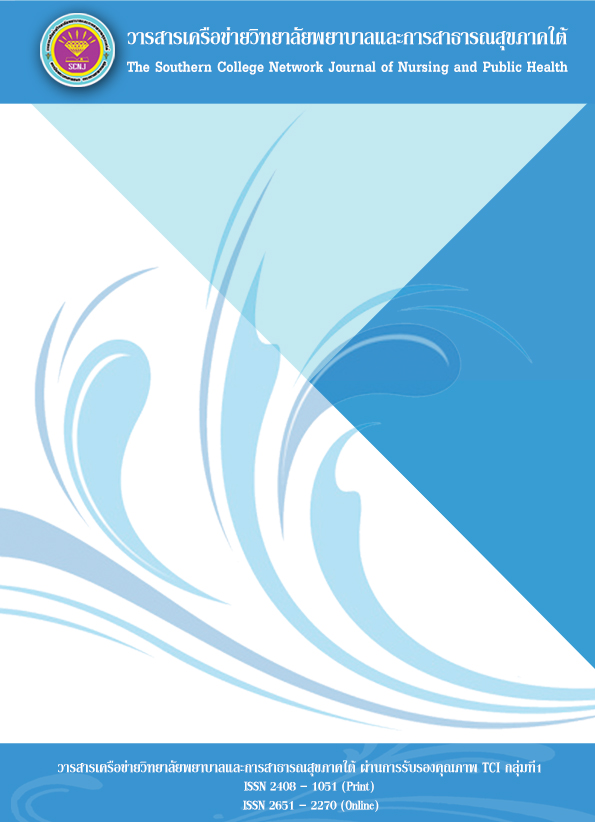ปัจจัยที่มีความสัมพันธ์กับพฤติกรรมการสูบบุหรี่ของผู้ป่วยจิตเวชหอผู้ป่วยใน โรงพยาบาลจิตเวชสงขลาราชนครินทร์
คำสำคัญ:
พฤติกรรมการสูบบุหรี่, ผู้ป่วยจิตเวชบทคัดย่อ
การวิจัยเชิงพรรณนานี้ มีวัตถุประสงค์เพื่อศึกษาพฤติกรรมการสูบบุหรี่ และปัจจัยที่มีความสัมพันธ์กับพฤติกรรมการสูบบุหรี่ กลุ่มตัวอย่างเป็นผู้ป่วยจิตเวชโรงพยาบาลจิตเวชสงขลาราชนครินทร์ ที่พักรักษาตัวในหอผู้ป่วยใน จำนวน 205 คน ใช้วิธีสุ่มตัวอย่างแบบหลายขั้นตอน เครื่องมือที่ใช้เป็นแบบสอบถามและแบบสัมภาษณ์ ได้แก่ ข้อมูลทั่วไป แบบสอบถามและแบบสัมภาษณ์พฤติกรรมการสูบบุหรี่ ตามแนวคิดของ Tomkins โดยแบบสอบถามผ่านการตรวจสอบความตรงเชิงเนื้อหาและหาค่าสัมประสิทธิ์แอลฟาของครอนบาค ได้เท่ากับ 0.86 วิเคราะห์ข้อมูลสถิติหาความถี่ ร้อยละ ค่าเฉลี่ย ส่วนเบี่ยงเบนมาตรฐาน และค่าไคสแควร์ ผลการวิจัยพบว่า
1. กลุ่มตัวอย่างมีพฤติกรรมการสูบบุหรี่โดยรวมอยู่ในระดับมาก (M=2.38, SD=.74) เมื่อพิจารณารายด้าน พบว่าพฤติกรรมการสูบบุหรี่ที่มีค่าเฉลี่ยระดับมาก สูงสุด คือ พฤติกรรมการสูบบุหรี่เป็นนิสัยความเคยชิน (M=2.44, SD=.75) สำหรับข้อมูลเชิงคุณภาพพบว่าพฤติกรรมการสูบบุหรี่ของกลุ่มตัวอย่าง เกิดจากนิสัยความเคยชิน การมองไปในแง่ดี การมองโลกในแง่ลบ และขาดการสูบบุหรี่ไม่ได้ ขณะที่พักในโรงพยาบาล กลุ่มตัวอย่างมีอาการขาดบุหรี่ และมีวิธีหยุดความคิดด้วยตนเองเมื่ออยากสูบบุหรี่ได้ มีความต้องการให้ทางโรงพยาบาลช่วยเหลือเพื่อลดความอยากสูบบุหรี่
2. เพื่อนสนิทสูบบุหรี่ (X2=9.045; p=.01) และจำนวนมวนการสูบต่อวัน (X2=16.600; p=.002) มีความสัมพันธ์กับพฤติกรรมการสูบบุหรี่ อย่างมีนัยสำคัญทางสถิติที่ระดับ .001
ควรมีการจัดกลุ่มกิจกรรมบำบัดสำหรับผู้ป่วยที่ต้องการเลิกบุหรี่ เพื่อการดูแลช่วยเหลือภาวะขาดบุหรี่ ป้องกันการกลับไปสูบบุหรี่ซ้ำ และให้เลิกบุหรี่ได้อย่างถาวร
เอกสารอ้างอิง
Boonsirm, C., Suthitivanit, P., Ravisanon, W. (2009). Smoking Behaviors among Youth in Chiyaphum Province. Journal of Health Science, 3(2), 6-14. (in Thai)
Campaign for Non-smoking Campaign Foundation. (2010). Symptoms That Result from Smoking Cessation. Retrieved Jan 7, 2019 from https://www.thaihealth.or.th/Content/21294
Chaikoolvatana, C., Sutti, P., & Jaimalai, W. (2017). Smoking Behavior and Risk Factors Associated with Smoking of Early Adolescents in Phayao Province, Thailand. Nursing Journal of the Ministry of Public Health, 27(3), 57-67. (in Thai)
Champat, C., Kusol, K., & Sonpaveerawong, J. (2019). Factors Related to Smoking among Buddhist Monks in Muang District of Surat Thani Province. The Southern College Network Journal of Nursing and Public Health, 6(2), 81-90. (in Thai)
Chayawattanawong, N. (2010). Smoking Habits of Male Students, Silpakorn University Phetchaburi IT Campus. Bangkok: Silpakorn University. (in Thai)
Chidnayee, S., & Yottavee, W. (2018). Factors Related with Smoking Behaviors of Youth at Uttaradit. Boromarajonani College of Nursing, Uttaradit Journal, 10(1), 83-93. (in Thai)
Choorat, N. (2016). The Study of Causes and Ways to Prevent a Recurrence of Schizophrenic Patients in The Community of Pi-Leng District Health Care Promoting Hospitals which Experiencing Unrest Situation in the Southern Provinces of Thailand. Princess of Naradhiwas University Journal of Humanities and Social Sciences, 3(1), 24-36. (in Thai)
Department of Health. (2015). To support Thai Children not to Smoke. Retrieved Jan 7, 2019 from https://www.thaihealth.or.th/Content/28379.
Heale, R., & Griffin, M. T. Q. (2009). Self-Efficacy with Application to Adolescent Smoking Cessation: a Concept Analysis. Journal of Advanced Nursing, 65(4), 912-8.
Information Center and Investigative News for Civil Rights. (2017). Schizophrenic Patients are More Smoking, Some Smoke 21-30 Cigarettes a day. Retrieved from. https://www.tcijthai.com/news/2017/22/current/7357
Khunsi, P., & Sawangcharoen, K. (2013). Cognitive Behavioral Therapy for Smoking Cessation in Patients with Schizophrenia. Thai Journal of Nursing, 62(1), 55-64. (in Thai)
Krejcie, R. V., & Morgan, D. W. (1970). Determining Sample Size for Research Activities. Educational and Psychological Measurement, 30, 607-610.
Lotrakul, M., & Sukanich, P., (2018). Ramathibodi Psychiatry (4th ed). Bangkok: Department of Psychiatry Faculty of Medicine, Ramathibodi Hospital Mahidol University. (in Thai)
National Statistical Office. (2014). The Smoking Situation in Thailand. Retrieved Jan 7, 2019 from https://thaipublica.org/2016/02/thaihealth-8-2-2557
National Statistical Office. (2017). The Smoking Situation in Thailand. Retrieved Jan 7, 2019 from http://www.nso.go.th/sites/2014/Pages/News/2561/N31-08-61-1.aspx
Pennadee, P. (2013). Factors and Smoking Behavior of Uttaradit Teachnological College. Retrieved Jan 7, 2019 from https://slideplayer.in.th/amp/3232168/
Phitayarungsarit, S., & Bpangrajaang, P. (2018). Thailand Tobacco Consumption Statistics Report 2018. Bangkok: Jarernmankong Printing. (in Thai)
Phugsachart, P., Wisitthammasri, N., & Ha-upala, A., (2017). Teaching and Learning to Control Cigarette Consumption: Psychiatric Nursing. Bangkok: Benjapual Company. (in Thai)
Ruangtrakool, S., (2014). Psychiatry (10th ed). Bangkok: Ruenkaew Printing. (in Thai)
Satra, T., Wannasewok, K., Atsariyasing, W., & Luisirirojanakul, J. (2017). Prevalence of Nicotine Dependence in Schizophrenic Patients, Siriraj Hospital, Bangkok. J Psychiatr Assoc Thailand, 62(4), 289-298. (in Thai)
Siriratsamee, B., Jambpaklaai, A., Siriratsamee, T., Gaynroht, P., Pornwiwatanachai, S., & Gontong, T. (2010). Impact of Tobacco Control Policy in Thailand the 3rd National Smokers Survey 2008. Nakhonpathom: Institute for Population and Social Research Mahidol University. (in Thai)
Songkhla Ratchanakarindra Psychiatric Hospital: Medical Record Audit. (2018). Report Inpatient Bed Occupancy Statistics in February - April 2019. Songkhla. (in Thai)
Srisatidnarakul, B. (2010). The Methodology in Nursing Research (5th ed). Bangkok: You and I Intermedia. (in Thai)
Suankul, P. (2009). The Application of Step Theory to Change Behavior in Smoking Cessation of Conscription Officers in Vibhavadi- Rangsit Camp, Surat Thani. Bangkok: Mahidol University. (in Thai)
Thai Civil Rights and Investigative Journalism. (2017). Schizophrenia Patients are More Smoking, Some Smoke 21-30 Cigarettes a Day. Retrieved Jan 7, 2019 from https://www.tcijthai.com/news/ 2017/22/current/7357
Thepkhamram, P. (2014). Depression Because Smoking. Retrieved Jan 7, 2019 from https://www.thaihealth. or.th/Content/26313
Tomkins, S. S. (1966). Psychological Model for Smoking Behavior. Amer. J. Pub. Health, 56, 17-20.
Ward, M. M., Swan, G. E., & Jack, L. M. (2001). Self-Reported Abstinence Effects in the First Month After Smoking Cessation. Addictive Behaviors, 26(3), 311-27.
Wisaprom, D., Palasak, S., Srichalee, S., & Khunvaradisai, N. (2014). Behavior and Intentions to Smoking Cessation of Psychiatric Patients. Prasrimahabhodi Hospital. Isan Journal of Pharmaceutical Sciences, 9(Supplement), 176. (in Thai)
ดาวน์โหลด
เผยแพร่แล้ว
ฉบับ
ประเภทบทความ
สัญญาอนุญาต
1. บทความหรือข้อคิดเห็นใด ๆ ที่ปรากฏในวารสารเครือข่าย วิทยาลัยพยาบาลและการสาธารณสุขภาคใต้ ที่เป็นวรรณกรรมของผู้เขียน บรรณาธิการหรือเครือข่ายวิทยาลัยพยาบาลและวิทยาลัยการสาธารณสุขภาคใต้ ไม่จำเป็นต้องเห็นด้วย
2. บทความที่ได้รับการตีพิมพ์ถือเป็นลิขสิทธิ์ของ วารสารเครือข่ายวิทยาลัยพยาบาลและการสาธารณสุขภาคใต้








